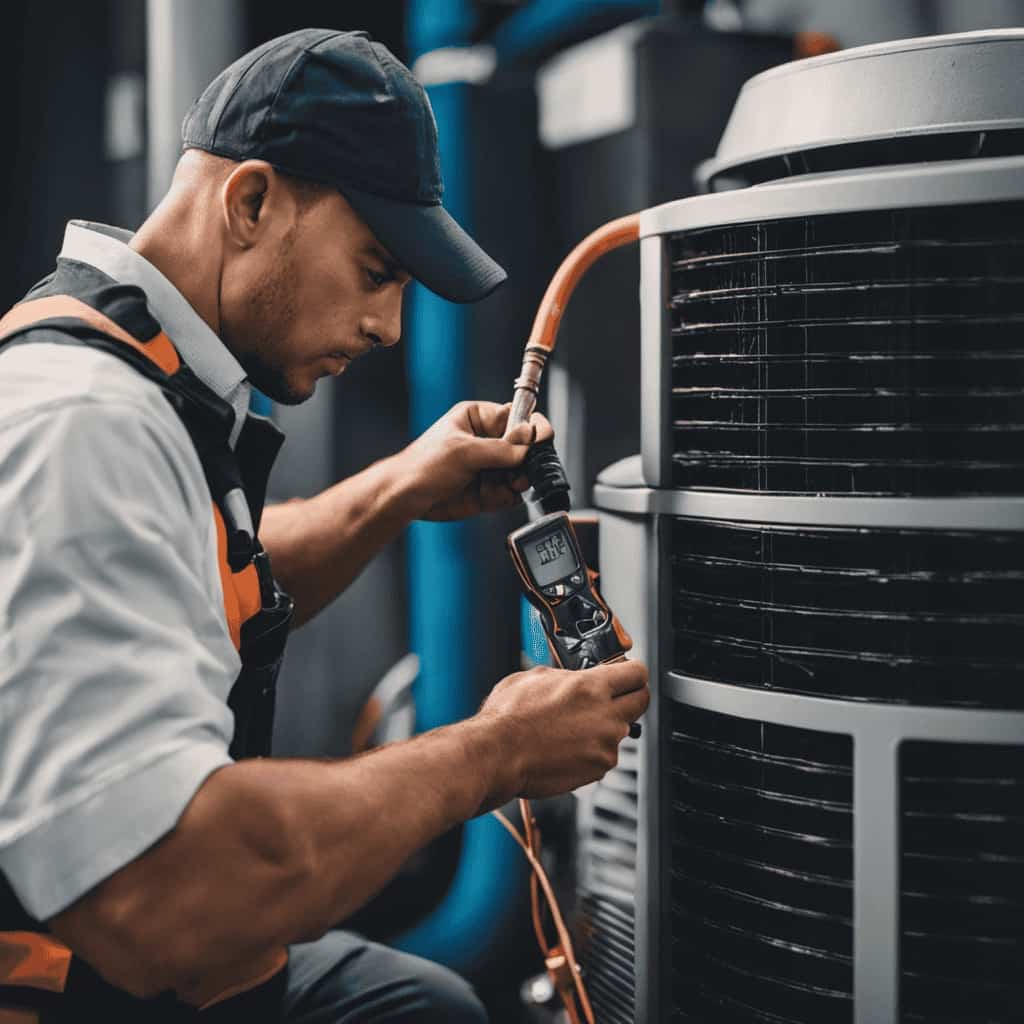
Geothermal heat pumps: the pinnacle of efficiency.
In this article, we delve into the world of geothermal heat pump systems, exploring their remarkable efficiency and the factors that affect it.
We’ll uncover the energy savings that can be achieved and share tips for maximizing efficiency.
By properly sizing these systems and utilizing ground heat exchangers, we can enhance their performance.
Join us on this insightful journey as we compare geothermal heat pumps to traditional HVAC systems, revealing the true power of efficiency.
Key Takeaways
- Geothermal heat pump systems reduce energy consumption and minimize environmental impact.
- Efficiency ratings such as COP and EER help in selecting the right heat pump for optimal performance and energy savings.
- Factors such as property size, installation quality, ground loop system, and regular maintenance affect the efficiency of geothermal heat pump systems.
- Efficient geothermal heat pump systems can achieve up to 50% savings on heating and cooling costs, reducing reliance on fossil fuels and contributing to a sustainable future.
The Importance of Efficiency in Geothermal Heat Pump Systems
We believe that efficiency is crucial in geothermal heat pump systems. When it comes to harnessing the Earth’s natural heat, maximizing efficiency is paramount. Efficient geothermal heat pump systems not only reduce energy consumption, but also minimize environmental impact. By utilizing the Earth’s constant temperature, these systems can provide both heating and cooling, making them incredibly versatile.
With their high efficiency ratings, geothermal heat pumps offer significant energy savings compared to traditional heating and cooling systems. This not only translates into lower utility bills but also contributes to a greener and more sustainable future. Moreover, efficient geothermal systems operate quietly and require minimal maintenance, ensuring a comfortable and hassle-free experience for homeowners.
Understanding the Efficiency Ratings of Geothermal Heat Pumps
Let’s start by understanding the efficiency ratings of geothermal heat pumps. These ratings provide valuable information about how effectively the heat pump operates and how much energy it consumes.
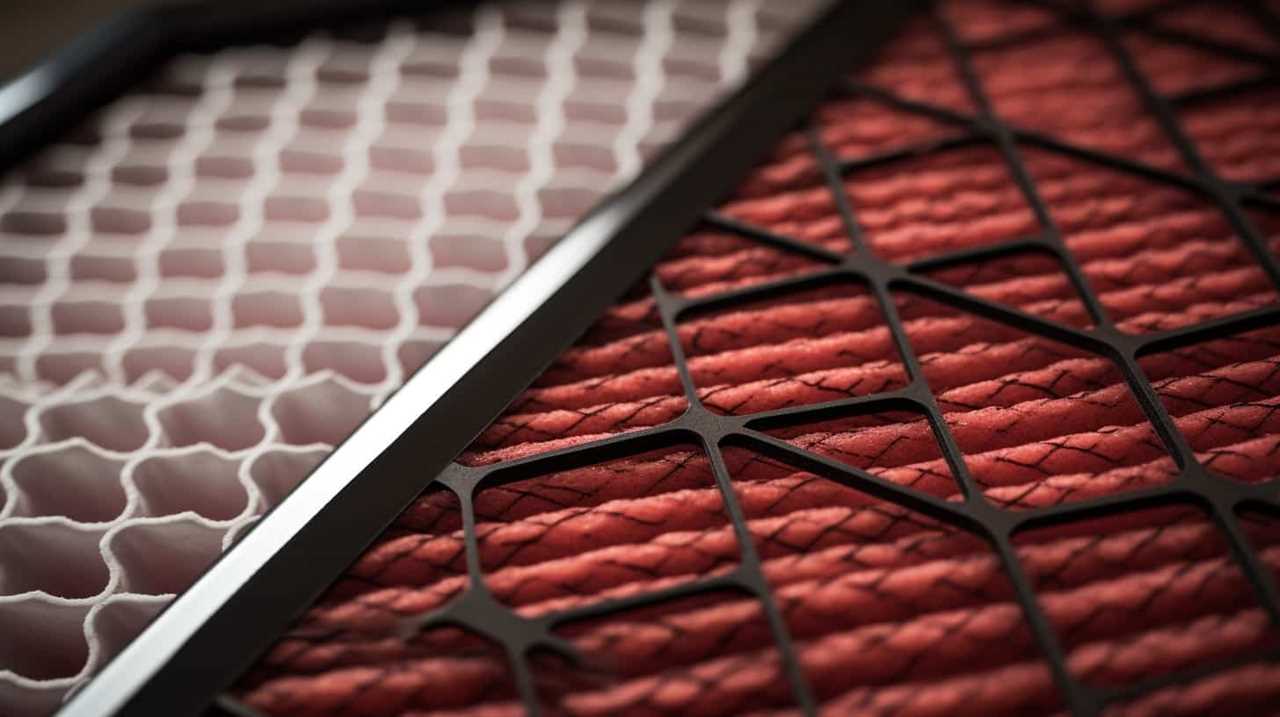
Rating System Explained
The efficiency ratings of geothermal heat pumps provide us with a clear understanding of their performance and energy-saving capabilities. These ratings are crucial in helping us make informed decisions about which heat pump to choose for our homes.
The rating system for geothermal heat pumps is based on two key measurements: Coefficient of Performance (COP) and Energy Efficiency Ratio (EER). The COP measures the ratio of heat produced to the amount of energy consumed, while the EER measures the cooling efficiency of the heat pump. Both ratings are important as they reflect the overall efficiency of the system.
Higher COP and EER ratings indicate better energy-saving capabilities and lower operating costs. By understanding these efficiency ratings, we can confidently select a geothermal heat pump that will provide optimal performance and significant energy savings for our homes.
Factors Affecting Efficiency
Understanding the efficiency ratings of geothermal heat pumps requires us to consider the factors that can affect their performance.

There are several key factors that play a significant role in determining the efficiency of these systems.
One important factor is the size and layout of the property. Larger properties may require a larger heat pump system to adequately heat or cool the space, while the layout of the property can impact the distribution of heat throughout the building.
Another factor is the quality of the installation. Proper installation is crucial for optimal performance and efficiency.
Additionally, the quality of the ground loop system, which transfers heat between the heat pump and the ground, can also affect the overall efficiency.

These factors will be further explored in the subsequent section about factors affecting the efficiency of geothermal heat pump systems.
Factors Affecting the Efficiency of Geothermal Heat Pump Systems
While there are various factors that can affect the efficiency of geothermal heat pump systems, we’ll focus on the most significant ones in this article.
One of the key factors is the quality of the ground loop system. A well-designed and properly installed ground loop can maximize the transfer of heat between the ground and the heat pump, increasing overall efficiency.
Another important factor is the size and insulation of the building. The heat pump needs to be sized appropriately to meet the heating and cooling demands of the space. Additionally, proper insulation reduces heat loss and ensures that the system doesn’t have to work harder to maintain desired temperatures.

Lastly, regular maintenance and servicing of the heat pump system is crucial for optimal performance. Regular checks and cleaning of filters, coils, and ducts can help maintain efficiency and prevent any potential issues.
Energy Savings With Efficient Geothermal Heat Pump Systems
By optimizing the performance of our geothermal heat pump systems, we can achieve significant energy savings. This means that not only will we be able to reduce our carbon footprint, but we’ll also see a noticeable decrease in our energy bills.
Efficient geothermal heat pump systems are designed to extract heat from the ground and transfer it into our homes or buildings with minimal energy loss. By using the Earth’s natural heat, we can drastically reduce our reliance on fossil fuels and traditional heating systems.
With efficient geothermal heat pump systems, we can save up to 50% on our heating and cooling costs. This not only benefits our wallets but also contributes to a more sustainable future.
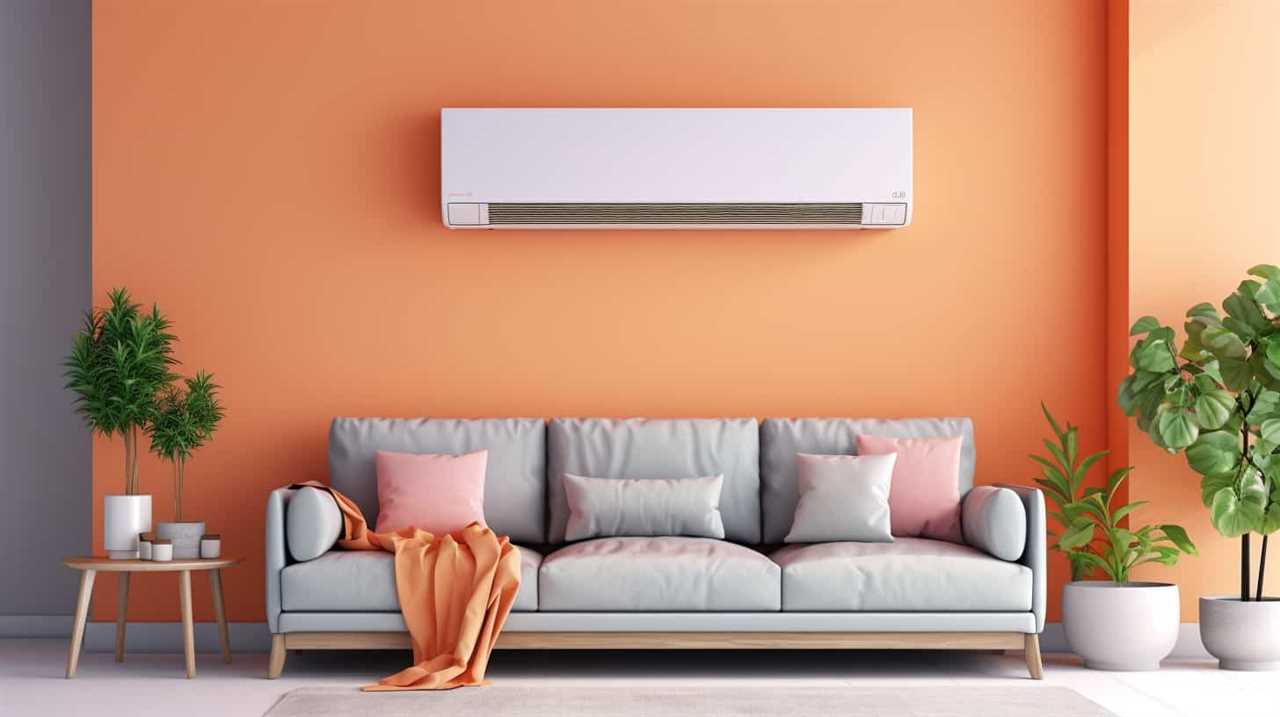
Now, let’s explore how we can maximize efficiency through proper geothermal heat pump sizing.
Maximizing Efficiency Through Proper Geothermal Heat Pump Sizing
To ensure maximum efficiency, we must properly size our geothermal heat pumps and consider the specific needs of our homes or buildings. This involves calculating the heating and cooling loads, as well as understanding the geology and climate of the area. By selecting the right size for our geothermal heat pump, we can avoid unnecessary energy waste and ensure optimal performance.
If the heat pump is too large, it will cycle on and off frequently, leading to increased wear and tear and decreased efficiency. On the other hand, if it’s too small, it will struggle to meet the heating and cooling demands of the space. Proper sizing is crucial to achieving energy savings and maintaining a comfortable indoor environment.
Now, let’s explore the role of ground heat exchangers in enhancing efficiency.

The Role of Ground Heat Exchangers in Enhancing Efficiency
As we delve into the topic of enhancing efficiency, it is important to understand the crucial role that ground heat exchangers play in maximizing the performance of geothermal heat pumps. Ground heat exchangers, also known as ground loops, are an integral part of geothermal heat pump systems. They allow for the transfer of heat between the earth and the heat pump, enabling efficient heating and cooling of buildings. The ground heat exchanger consists of a series of pipes buried underground, typically in a horizontal or vertical configuration. These pipes are filled with a heat transfer fluid, which absorbs heat from the ground during the heating mode and releases heat into the ground during the cooling mode. The efficiency of a geothermal heat pump system depends greatly on the design and installation of the ground heat exchanger. Proper sizing, layout, and depth are essential to ensure optimal heat transfer between the earth and the heat pump system. Here is a table summarizing the different types of ground heat exchangers and their characteristics:
| Ground Heat Exchanger Type | Characteristics |
|---|---|
| Horizontal | – Pipes are buried in a trench horizontally |
- Requires a large land area
- Suitable for residential applications | | Vertical | – Pipes are installed vertically in boreholes
- Requires less land area
- Suitable for both residential and commercial applications | | Pond/Lake | – Pipes are submerged in a body of water
- Utilizes the water’s thermal mass
- Suitable where a water source is readily available |
Efficiency can be further enhanced by integrating ground heat exchangers with other energy-saving technologies, such as energy recovery ventilation and solar thermal systems. By leveraging the constant temperature of the earth, geothermal heat pumps with well-designed ground heat exchangers can provide efficient and sustainable heating and cooling solutions for homes and buildings.
Efficiency Comparison: Geothermal Heat Pumps Vs. Traditional HVAC Systems
Geothermal heat pumps offer higher efficiency and cost savings when compared to traditional HVAC systems. Here are five reasons why:
Energy savings: Geothermal heat pumps utilize the constant temperature of the earth to efficiently heat or cool a building, resulting in lower energy consumption and reduced utility bills.

Environmental impact: By using the earth’s natural heat, geothermal heat pumps produce fewer greenhouse gas emissions, reducing our carbon footprint and promoting a cleaner environment.
Long-term investment: Although geothermal heat pumps may have higher upfront costs, their energy efficiency and durability translate into long-term savings, making them a wise investment.
Comfortable indoor climate: Geothermal heat pumps provide consistent heating and cooling throughout the year, ensuring a comfortable and pleasant indoor environment.
Quiet operation: Unlike traditional HVAC systems that can be noisy, geothermal heat pumps operate quietly, creating a peaceful and serene atmosphere in your home or office.
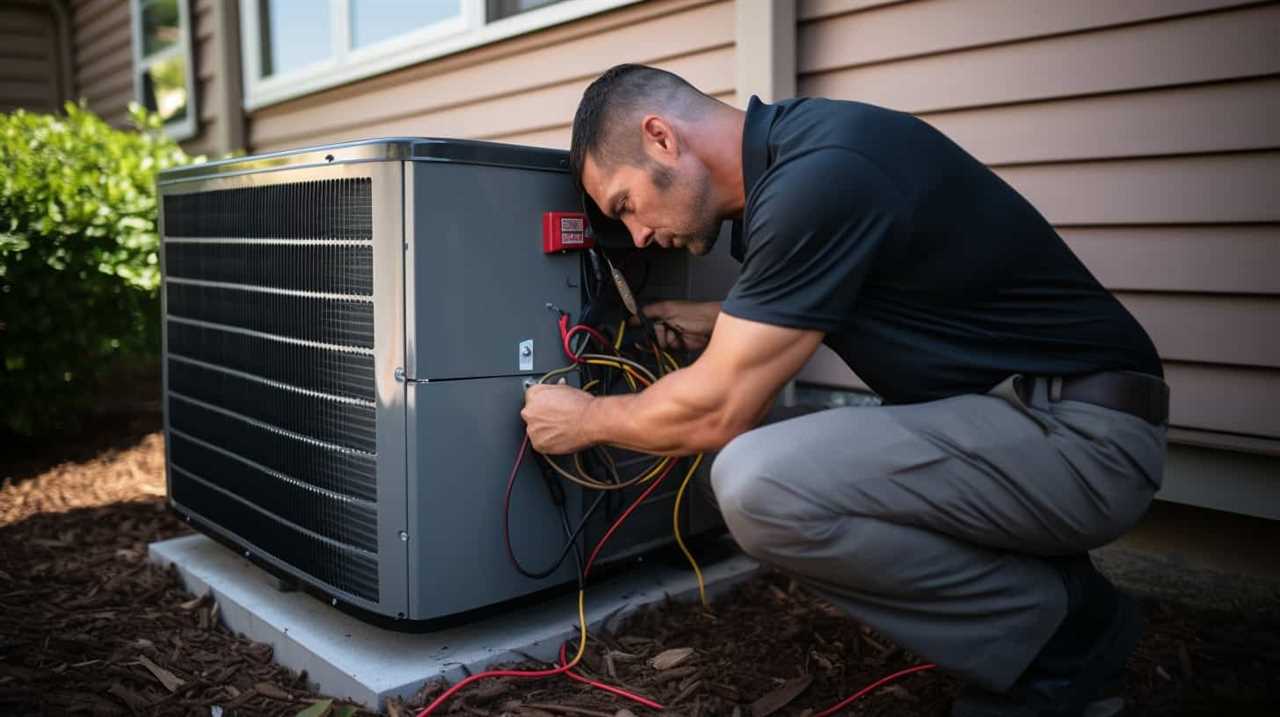
With these advantages, geothermal heat pumps prove to be a superior choice for those seeking efficient and cost-effective heating and cooling solutions.
Tips for Improving the Efficiency of Geothermal Heat Pump Systems
Here are our top recommendations for maximizing the efficiency of geothermal heat pump systems.
Proper insulation: Make sure your home is well-insulated to minimize heat loss or gain, allowing the heat pump to work more efficiently.
Regular maintenance: Schedule regular maintenance checks to ensure that your geothermal heat pump system is operating at its peak efficiency. This includes cleaning or replacing air filters, checking refrigerant levels, and inspecting the system for any potential issues.
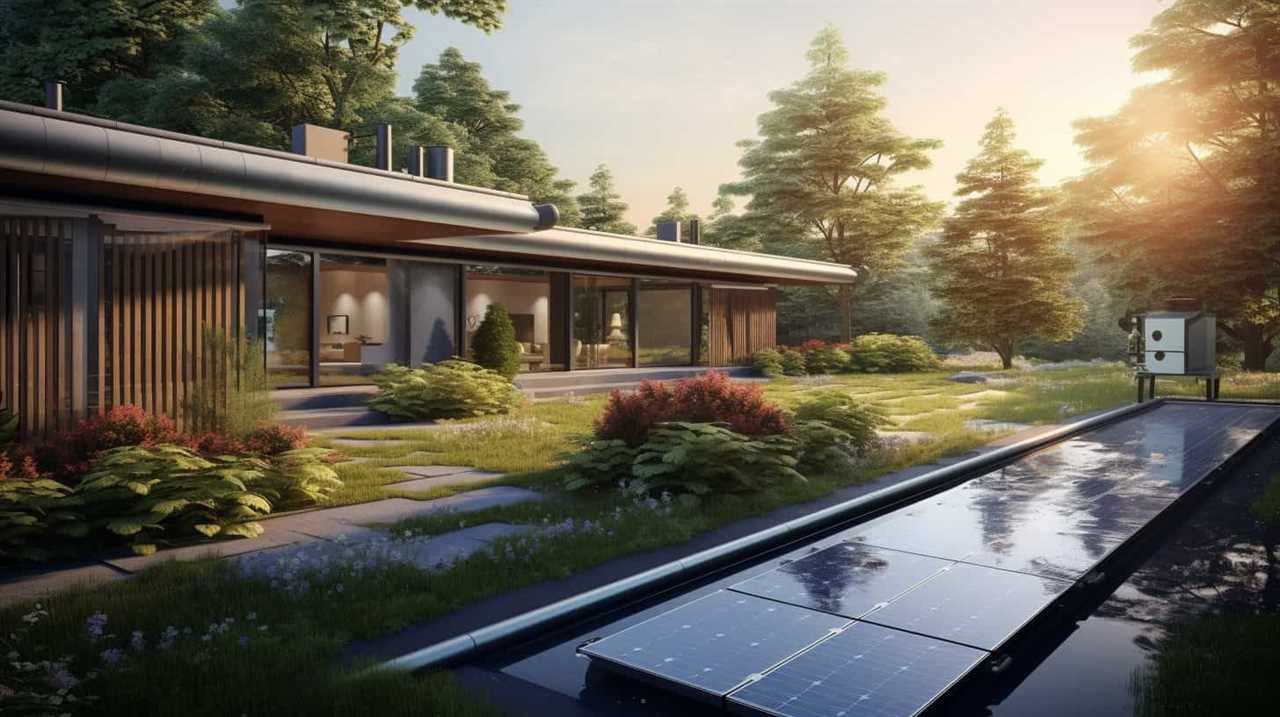
Programmable thermostat: Use a programmable thermostat to regulate the temperature in your home. This allows you to set different temperatures for different times of the day, optimizing energy usage.
Consider zoning: Divide your home into zones and install separate thermostats for each zone. This way, you can heat or cool only the areas that are occupied, saving energy and maximizing efficiency.
Frequently Asked Questions
How Does Geothermal Heat Pump Efficiency Compare to Other Renewable Energy Sources?
Geothermal heat pump efficiency is comparable to other renewable energy sources. It provides a sustainable and cost-effective solution for heating and cooling. It’s a reliable choice that helps reduce our environmental impact.
Are There Any Government Incentives or Tax Credits Available for Installing a Geothermal Heat Pump System?
Absolutely! There are plenty of government incentives and tax credits available for installing a geothermal heat pump system. These incentives can significantly offset the initial costs and make it a more affordable option for homeowners.

Can Geothermal Heat Pumps Be Used in All Climates, or Are They More Suitable for Certain Regions?
Yes, geothermal heat pumps can be used in all climates. They are suitable for both cold and warm regions. The efficiency and effectiveness of the system may vary depending on the climate and geological conditions of the area.
What Maintenance Is Required to Ensure the Ongoing Efficiency of a Geothermal Heat Pump System?
To ensure the ongoing efficiency of a geothermal heat pump system, regular maintenance is necessary. This includes checking and cleaning filters, inspecting and lubricating components, and tuning the system for optimal performance.
How Long Does It Typically Take for a Geothermal Heat Pump System to Pay for Itself Through Energy Savings?
It usually takes several years for a geothermal heat pump system to pay for itself through energy savings. But once it does, we can enjoy the sweet rewards of lower utility bills and a more comfortable home.
What Factors Contribute to the Efficiency of Geothermal Heat Pump Systems?
The efficiency of geothermal heat pump systems is influenced by several factors. First, proper installation and sizing of the system, including the heat pump and ground loop, are crucial for optimal operation. Additionally, the quality and conductivity of the ground, as well as the temperature differential between the ground and the heat pump, impact efficiency. Proper maintenance and regular servicing also contribute to the overall efficiency of geothermal heat pump systems.
Conclusion
In conclusion, geothermal heat pumps offer a highly efficient and sustainable solution for heating and cooling needs. With proper sizing and the use of ground heat exchangers, these systems can maximize efficiency and provide significant energy savings.
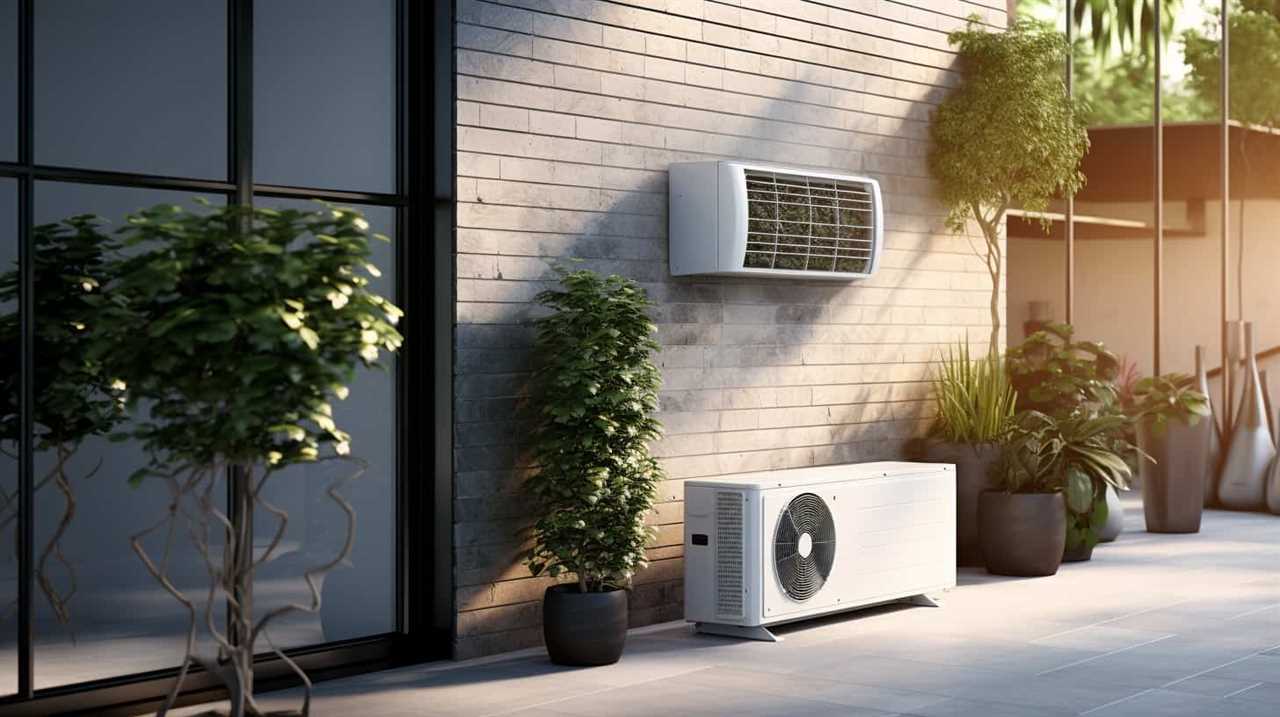
Compared to traditional HVAC systems, geothermal heat pumps are like a breath of fresh air, harnessing the Earth’s natural heat to create a comfortable and eco-friendly environment.
So why settle for less when you can tap into the power of geothermal energy?









